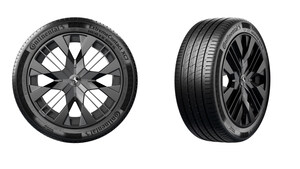Continental Mobility Study Reveals Electric Cars Facing Image Problems
- Drivers mainly see electric cars as eco-friendly
- Only a few consider them sporty and fun to drive
- More and more drivers reject electric cars in all age groups
DETROIT, April 22, 2015 /PRNewswire/ -- Electric cars have a special "green" image among drivers in the U.S., but so far they barely evoke any emotions. In the recent Continental Mobility Study, a clear majority of respondents see fully electric-driven vehicles as environmentally friendly (71%), but the perception of image factors that play a key role in the purchase decision is low, such as driving pleasure (31%), attractive design (38%), and sportiness (27%). In addition to the higher purchase price compared to conventional vehicles, the unbalanced image dampens drivers' expectations as to when they will actually purchase such a vehicle.
For the Mobility Study, the international automotive supplier Continental had the market and social research institute infas conduct a representative survey of drivers in the U.S. and Germany, and a qualitative survey in France, Japan, and China. The Mobility Study was also supported by interviews with experts in the automotive industry and supplemental research.
Compared to the 2011 Continental Mobility Study, significantly fewer drivers in all age groups expect to use a fully electric car in the medium term (four to 10 years). The expectation figures fell from 33% to 24% among those 16 to 30 years old, and from 31% to 21% among those 31 to 59 years old. The reluctant attitude amongst drivers 60 and over – of all the groups, a population segment featuring an affinity for cars as well as high-purchasing power – decreased from 46% to 21%. At the same time, there was a strong increase over the past three years in the number of drivers in all age groups who would switch to an electric car only if vehicles with internal combustion engines were no longer available (16 to 30 years old: from 2% to 12%; 31 to 59 years old: from 1% to 14%). The increase has been particularly strong in the group of 60 years and older (from 2% to 26%).
"After several booming years, the purely electric car is currently facing image problems," said Jose Avila, Continental Executive Board member and head of the Powertrain division, commenting on the findings of the Mobility Study.
However, with hybridization – the combination of ultra-modern combustion engines with electric motors – he sees a solution.
"Increasing hybridization, including 48-Volt technology, will clear the way for electromobility. It allows a reasonable cost/benefit ratio and gives drivers their first experience with electromobility."
The degree of electrification should be aligned to the car and the driving profile. With innovative solutions Continental is making future powertrain systems environmentally friendly and affordable, all under the motto "Clean Power."
"With increasingly tighter restrictions on exhaust emissions and CO2, and the changes in the way consumers are thinking about their vehicles, we continue to develop innovative technologies aimed at achieving regulatory standards and meeting the driver's needs," said Kregg Wiggins, Senior Vice President, Powertrain Division, North America. "It is inevitable that we will need electrified propulsion systems if we are to meet the fleet emission targets in the long run. According to estimates within the industry, about 20 percent of new vehicles worldwide will have electrified drive systems by 2025, with around half of these being 48-Volt hybrids, which is why our strategy is aimed at electrification that is tailored to fit a customer's needs."
Wiggins is confident that the image of e-vehicles will improve in the future as electrification is continuously introduced.
"Hybrid vehicles can create acceptance for electric cars. Drivers have the possibility to travel stretches of road in hybrid vehicles using only electric power and experience firsthand how much fun they are to drive."
Wiggins highlighted that the findings of the Mobility Study confirms that there will be further improvements in combustion engine efficiency, while simultaneously moving forward with the strategy for the gradual electrification of the powertrain.
Continental at the SAE World Congress
Kregg Wiggins will be presenting on the AVL Technology Leadership Panel, "Innovation in Powertrain Technology to Achieve 2025 Requirements & Beyond," on Wednesday, April 22, 2015, at 1:30 p.m., during the SAE World Congress in Detroit at the Cobo Center. He will discuss, in more detail, technologies that will help meet the 2025 fuel economy standards, Continental's powertrain strategy and new innovations for the future.
The study:
In the second half of 2014, international automotive supplier Continental had the market and social research institute infas conduct a representative survey of 2,300 (non-)drivers in the U.S. and 1,800 in Germany, and a qualitative survey of 400 vehicle owners each in Germany, the United States, France, Japan and China. Interviews with experts from the automotive industry and research supplement the results of the study with insights from a professional point of view.
Continental develops intelligent technologies for transporting people and their goods. As a reliable partner, the international automotive supplier, tire manufacturer, and industrial partner provides sustainable, safe, comfortable, individual, and affordable solutions. In 2014, the corporation generated preliminary sales of approximately €34.5 billion with its five divisions, Chassis & Safety, Interior, Powertrain, Tire, and ContiTech. Continental currently employs approximately 200,000 people in 53 countries.
Links
www.continental-automotive.com
Online Media Database: www.mediacenter.continental-corporation.com
SOURCE Continental
Related Links
WANT YOUR COMPANY'S NEWS FEATURED ON PRNEWSWIRE.COM?
Newsrooms &
Influencers
Digital Media
Outlets
Journalists
Opted In





Share this article